#Dichotomy Films
Explore tagged Tumblr posts
Text
'Juror No. 2' Movie and Blu-ray Review
The following review was written by Ultimate Rabbit correspondent, Tony Farinella. “Juror No. 2” is the latest film from legendary director Clint Eastwood, and at age 94, it is beyond impressive he is still directing films. With this one, the biggest controversy surrounding it is the fact that it was released in a limited number of theaters. With a pedigree like Eastwood’s, you would expect his…

View On WordPress
#2024 Movies#Blu ray#Cedric YarBrough#Chris Messina#Clint Eastwood#Dichotomy Films#Dolby Atmos#Francesca Eastwood#Gabriel Basso#J.K. Simmons#Jonathan Abrams#Juror No. 2#Kiefer Sutherland#Malpaso Productions#Nicholas Hoult#Toni Collette#Tony Farinella#Warner Brothers#Warner Brothers Home Entertainment#Zoey Deutch
2 notes
·
View notes
Text
One of the most fascinating pieces of movie analysis I've ever read is J.B. Kaufman's thesis of the "two different Snow Whites" in Disney's Snow White and the Seven Dwarfs.
He writes about this in both of his two books on the making of the movie, The Fairest One of All and its companion piece Snow White and the Seven Dwarfs: The Art and Creation. His argument is that Snow White's two leading animators, Hamilton Luske and Grim Natwick, each gave Snow White a slightly different personality when they drew her. A close look at the movie, and knowledge of who animated which moments, reveals subtle differences in Snow White's expressions and body language. Luske, her head animator who handled the majority of her scenes, portrayed her as a more purely innocent, childlike character, while Natwick, the creator of Betty Boop, gave her a little more maturity, sophistication, and sauciness.
You can see the difference, for example, when comparing her girlish interactions with the animals in "With a Smile and a Song" and "Whistle While You Work" (animated by Luske) to her flirtatious smiling at the Prince from the balcony, or her "mothering" of the dwarfs as she examines their dirty hands (animated by Natwick). Or her responses to Grumpy in the scene before the Washing Song: as she asks "What's the matter? Cat got your tongue?" she looks at him with a devilish grin (Natwick), but then when he sticks out his tongue at her, she reacts with the most wide-eyed, girlish shock (Luske).
Now, I don't know if these two men really held different views of Snow White's character, or if it just worked out that Luske drew Snow White's more innocent scenes while Natwick was assigned her more grown-up moments. But either way, Kaufman argues that this "tension," the movie's constant push-and-pull between "Snow White as a wide-eyed innocent girl" and "Snow White as a self-assured young woman," makes her an especially interesting Disney Princess. I tend to agree, especially because, miraculously, there's no sense of inconsistency in her character. She comes across as a young girl on the verge of womanhood, who naturally can still be naïve and childlike in some ways, but more grown-up and clever in others.
This thesis makes me wonder if certain "tensions" in other movies are the result of different viewpoints within the creative team.
For example, in Beauty and the Beast.
Linda Woolverton has often talked about her feminist goals in writing Belle's character, which sometimes clashed with her collaborators' visions of Belle as a more traditional fairy tale heroine. It just might have been those clashing viewpoints that created the dichotomy in Belle that I personally think makes her interesting. On the one hand, she's a strong-willed misfit rebel, partly inspired by Jo March in Little Women and by Katharine Hepburn's screwball comedy heroines, who longs for adventure, isn't looking for romance until she unexpectedly finds it, stands up to men (and beasts) who abuse their power, and refuses to let anyone dominate her. On the other hand, she's a sensitive dreamer with delicate beauty and balletic grace, who wears pretty, ladylike dresses, adores fairy tales and love stories, and is sweet, nurturing, and almost motherly to her friends and loved ones. Yet somehow these two sides of her character co-exist with no sense of inconsistency between them.
There's also the dichotomy between the two different views of the Beast that the movie seems to present at once. On the one hand, there's the Beast as an unseemly brute, who's beastly form is both a just punishment for his flawed character and an outward symbol of it, and who needs to be "tamed" into proper "human" behavior, culminating in his physically turning human again. On the other hand, there's the Beast as a suffering, self-loathing outcast, unfairly hated, feared, and dehumanized, whose plight under the spell can easily be read as an AIDS allegory, and who needs to be accepted and loved as he is. I suspect that this also stems from different goals and viewpoints in the creative team. (For example, Howard Ashman's clash with the directors over whether the Prince should be a child or a man in the prologue – the former would have made him more "tragic" but the latter makes his punishment more "fair.")
I'd like to read an analysis of these "tensions" similar to Kaufman's analysis of the "two different Snow Whites."
#disney#snow white and the seven dwarfs#snow white#j.b. kaufman#beauty and the beast#belle#the beast#animated film#analysis#characterization#dichotomy
121 notes
·
View notes
Text
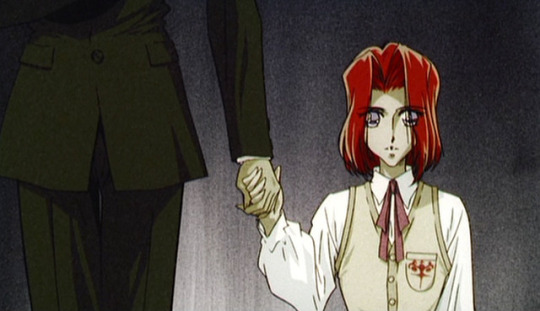
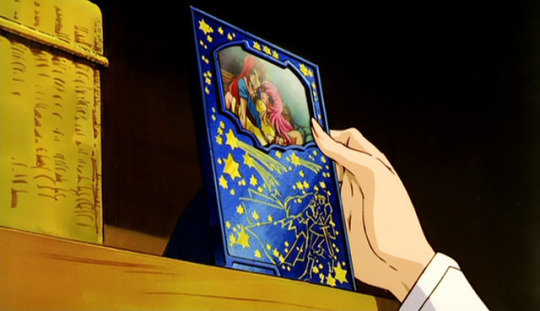
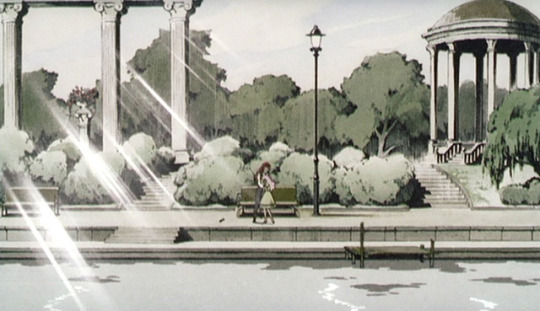
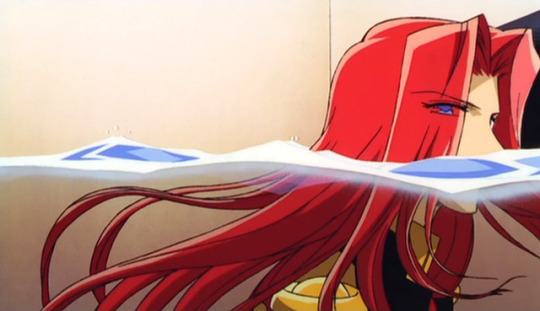
movie touga makes me so beyond insane. the way he got to inhabit the role of the doomed prince exactly like dios did in the series and died in the same senseless sacrificial way while someone he loved begged him to save himself. the way he suffered and suffered and was so brutalized and still somehow stayed gentle enough to drown for a girl he didnt even know. a version of touga that held onto his kindness and nobility and never turned bitter and hard in order to survive. so he died.
#🙈#utena#touga kiryuu#worst boy on campus#theres ofc more to say here about how he stayed trapped in this stupid gendered dichotomy btwn dominator (destroys) / prince (is destroyed)#but personally i do read the film as related to the series canon and like. imo this is who series touga wanted to be ultimately#he wanted to suffer the same agonies and then be utena's hero and die stupid and tragic and loved#he wanted to hold her in the chapel and tell her how much he cared instead of walking away completely unable to comfort her#but series touga just couldn't be that person. his life already happened a different way#he didnt want to survive. deep down he just wanted to be good and die. LIKE A MORON#i just. GOD. IT'S SO STUPID. BUT I LOVE HIM SO MUCH#fucking idiot who lacks the imagination to conceptualize himself surviving outside of patriarchal norms so he just wants to die for a woman!
24 notes
·
View notes
Text
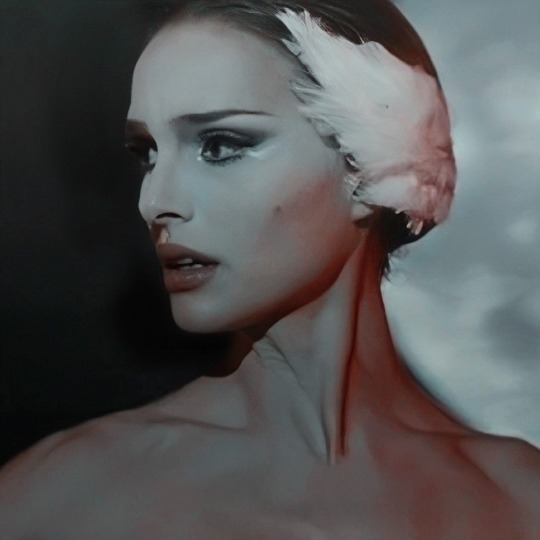




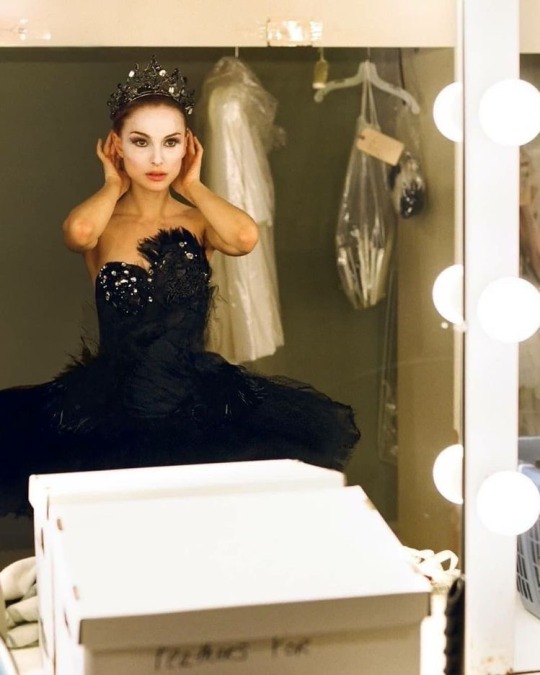
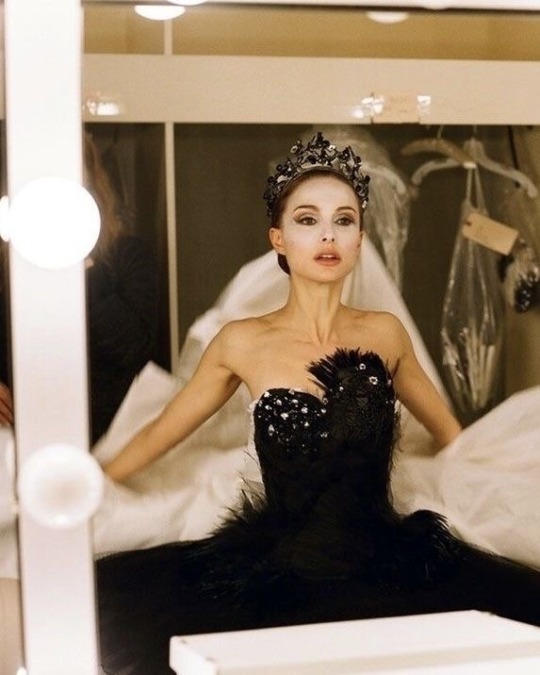
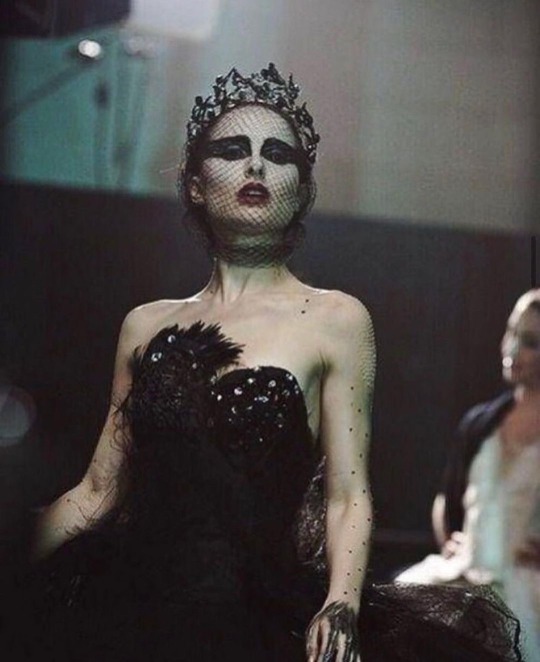
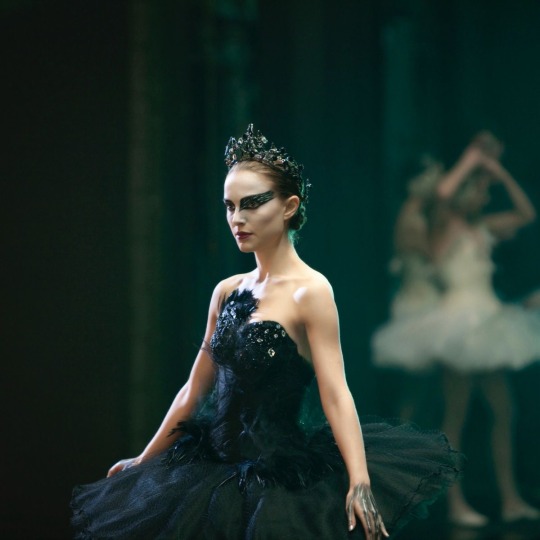
I relate to Nina in the sense of how her search for perfection ultimately led to her self destruction. Her light feminine energy which translated to her perfection seeking, and other aspects of her personality were a bit triggering for me considering how similar her characteristics are to mine.
I would say Lily was the best character of the film. Her down to earth and chilled out personality is something I aspire to be. Fierce. She was so fun-loving and effortless - living life without a care in the world. Sometimes an enigma and often depicted as Nina’s shadow side, Lily represents dark feminine energy and I am so here for it.
This is because Lily is essentially encompassed by authenticity. The dark feminine is freedom.
#light feminine energy#dark feminine energy#dichotomy#black swan#swan lake movie#nina from black swan#lily from black swan#natalie portman#mila kunis#primadonna girl#dollette aesthetic#film analysis
29 notes
·
View notes
Text


I'm so weak for the color symbolism of 6.03/6.04
particularly as an illustration of the, in my opinion, breaking point for them as this line that lizzie can no longer follow him across (falsely taking multiple lives in the name of their daughter). but also as a way of tying back to the poem, ode to the west wind, with which tommy indelibly ties their fates together as two people that are simultaneously one in the same, yet inconsolably different.

#the increasingly blatant angel/devil theming etc etc#the (admittedly clumsy at times) inversion of the madonna-wh*re dichotomy that is more or less the thesis of lizzie's entire character#it's kind of on the nose in all aspects but I'm a simple creature#and his (eventual) letting her go at the end is an interesting crumb of growth#for a man who has historically (consciously or not) barred off the progression of anyone in his orbit that may otherwise outgrow him#introspection‚ a study#imagery‚ a study#I KNOW the actual poem is a celebration of duality and maybe the film will circle back to this bUT
2 notes
·
View notes
Text
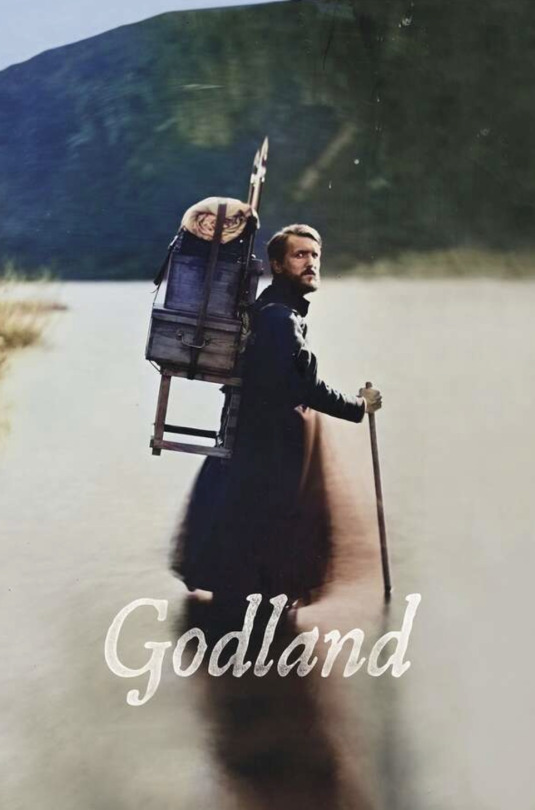
if you enjoyed the banshees of inisherin I very much recommend you watch this film because it’s also about two guys who hate each other and colonialism is involved and everything takes place next to the atlantic ocean
#one of the best movies I’ve watched in a long time for sure#and if you didn’t like banshees I also recommend this film because most of the things that didn’t quite land for me in that movie are done#much better in this one#I really enjoy both movies obviously but if we stick inside this random dichotomy I’ve imposed onto these two films#I think this one is superior#this movie is like horrifically beautiful. Idk how else to describe it#it sometimes feels like a horror movie even though it’s not at all
33 notes
·
View notes
Text
lilapasquale in the car + elenaenzo in the car, you know this post is in your future, right???
#letters from stephanie*#can't wait to see how it's filmed so i can compare the coloursss#i know my brain will make it about their worldviews...#i have a post of mine to reblog this is my fav dichotomy#biologist/chemist + mathematician/writer sentiment ilyyyyyyyyyyy
3 notes
·
View notes
Text
Remembering how much I liked interstellar as a movie and yet hated its entire blatant messaging
2 notes
·
View notes
Text
Maurice (1914) by E. M. Forster:

Introducing Clive Durham - the twink
#I don't plan to draw Clive but it's still interesting#I can imagine the ''very small man'' in Maurice's eyes is both slightly build and visibly shorter than him#I can't be mad that movie makers decided on showing them much more equal in size and body build#I can imagine that showing them as two very different looking men would bring a risk of feeding the stereotype#because average viewer in the 1980s still expected a gay couple to have the same gender dichotomy as man and woman🤔#but maybe if Maurice was filmed now - Clive and Maurice would much more resemble Charlie and Nick from Heartstopper?#maurice 1914#maurice em forster#e.m. forster#em forster#maurice hall#clive durham#maurice and clive
14 notes
·
View notes
Text
I’m working on the final fics of this year
I wanna acknowledge the ships I started really writing this year by exploring how they’ll celebrate the new year’s fireworks
And there’s a picture to go with each fic
So prepare for 6 fics coming tomorrow
#writing update#jacksepticeye#markiplier#nwtb#vintage husbands#silent film sweethearts#antique companions#death’s dichotomy#madmare#phantomhero
4 notes
·
View notes
Text
one thing this whole barbenheimer thing has taught me is that some people really cannot stand silly fun
#sometimes people just want to dress up and appreciate the bizarre dichotomies and connections#between two ostensibly very different films#though having finally seen both now i think there are some unlikely similarities
3 notes
·
View notes
Text

Dichotomie 3/3 .
@shot_by_just_humvn
#iso 400#analog#film photography#shotbyjusthumvn#shotonfilm#kodak portra 400#kodak film#cameras#photographers on tumblr#photos#dichotomy
0 notes
Text
Capturing the Quiet Moments: A Review of "The Farewell" (2019)
In the vast landscape of cinema, few films capture the intimate intricacies of family and culture quite like Lulu Wang’s “The Farewell.” This independent gem, released in 2019, offers a poignant and deeply personal exploration of familial bonds, cultural clashes, and the universal struggle of saying goodbye. Through its delicate storytelling and authentic performances, “The Farewell” stands as a…
#"The Farewell" review#Alex Weston score#Anna Franquesa Solano cinematography#Awkwafina performance#Chinese traditions#Chinese-American film#cinema critique#cinematic visuals#contemporary Chinese cinema#cross-cultural conflict#cultural commentary#cultural dichotomy#East meets West#emotional storytelling#ethical dilemmas#ethical practice in film#family bonds#family drama#family love#heartfelt film#Immigrant experience#immigrant identity#independent film review#indie film analysis#intimate storytelling#Lulu Wang#nuanced performances#quiet moments in film#terminal illness narrative#Zhao Shuzhen
0 notes
Text
fighting the urge to write horror <- guy that used to hate horror as a kid
#i think it’s cause i’ve found specific subgenres i enjoy#ie body horror (everyone go read false dichotomy on ao3)#and fairy tail esque horror (go read the juniper suite rn it’s so good and also has body horror)#and ofc whatever type of horror is catboydogmas haunted fox fics#i’m not so much a fan of horror movie but do love some of the old ones (the thing(1982) my beloved)#oh also LOVE the magnus archives#that sort of horror is great#but i probably couldn’t stomach most of these as films#i also got traumatised by having to read the skeleton in the dunny short book in primary school#so never touching that sort of thing ever again
1 note
·
View note
Text
Thoughts on my first Tarzan rewatch since I was a kid:
• Golly gee, I did not remember that both Kerchak and Kala’s very young son AND Tarzan’s parents get mauled by a leopard, it happens within the first ten minutes, and you actually SEE his parents’ bodies. Modern Disney would NEVER
• Also remember when Disney actually animated really good fight scenes, they had nail-biting tangible stakes, and they actually showed blood??? Remember when they weren’t cowards????
• REMEMBER WHEN TARZAN KILLED THE LEOPARD TRYING TO PROVE HIMSELF TO HIS ADOPTIVE FATHER HAVING NO IDEA THAT HE WAS AVENGING HIS BIOLOGICAL FATHER (AND MOTHER). REMEMBER THAT
• It’s been said before, but the effort put into the physicality of Tarzan is just top-tier—especially later into the film where he starts to mix his gorilla and learned human mannerisms. There is so much detail here and it’s fascinating
• Also, the times where they chose to make the gorilla conversations understandable to the audience or make them sound like gorillas (aka switch to Jane’s pov) is SO fascinating and does wonders for building up the “two worlds” dichotomy.
• Jane’s crush on Tarzan is SO obvious and honestly comes on so suddenly, she is delulu for days, but honestly I cannae blame her, if *I* was saved by a strong handsome wild man who couldn’t understand me but stared deeply into my eyes as if he could see my soul through them as he pressed the palms of our hands together, I’d probably fold too
• My favorite character was Tantor the elephant. WHAT a character arc, I was so proud of him
• Hey uhhhhhhhh remember how the villain of this movie died by inadvertently hanging himself and the movie indicated this by showing his dangling silhouette in a flash of lightning??? HELLO???
• Y’all like to give Ariel a hard time for giving up her voice for a man when Jane Porter permanently and irrevocably left civilized society to run away to the wilds of Africa to live with gorillas for a man she met a week or two ago who she’s still getting over language barrier issues with. I’m not saying she shouldn’t have done so, I completely support her decision, but I feel like if this movie weren’t so slept on some of y’all would have a lot more to say about it.
• In general Jane is a bit more unhinged than we give her credit for, and more power to her. She’s rapidly climbing the ranks of my favorite Disney princesses.
• And then her father joins her??? “People go missing all the time”???? LOL
• Finally, it’s been said before, but: Phil Collins, you legend. You did not have to go that hard on this film, but you did and we appreciate it so much
2K notes
·
View notes
Text
In celebration of the remarkable life and career of Val Kilmer (1959-2025), we're hosting a cross-fandom collection to honor his extraordinary contributions to film and the characters that captivated our hearts and imaginations.
About the Exchange
This event welcomes fanworks of all kinds celebrating Val Kilmer's diverse filmography. Whether you were moved by his portrayal of Jim Morrison, thrilled by his Iceman, enchanted by his Batman, or captivated by any of his other iconic roles, this is your opportunity to share your creativity with fellow fans.
Eligible Fandoms
All Val Kilmer roles and films are welcome, including but not limited to:
Top Gun/Top Gun: Maverick (Iceman)
Batman Forever (Bruce Wayne/Batman)
The Doors (Jim Morrison)
Tombstone (Doc Holliday)
Heat (Chris Shiherlis)
Willow (Madmartigan)
Real Genius (Chris Knight)
The Ghost and the Darkness (John Patterson)
The Saint (Simon Templar)
At First Sight (Virgil Adamson)
Kiss Kiss Bang Bang (Gay Perry)
Alexander (Philip II)
Thunderheart (Ray Levoi)
The Prince of Egypt (Moses, voice)
Any other film from his extensive career
Accepted Fanwork Types
We welcome all forms of creative expression:
Fanfiction: One-shots, multi-chapter works, poetry, scripts, alternative universes, crossovers
Fan Art: Digital art, traditional art, comics, photo manipulations
Poetic Works: Poems, sonnets, haiku, free verse inspired by Kilmer or his characters
Video Tributes: Fanvids, edits, animation
Audio Works: Podfics, song covers, original music
Crafts: Cosplay, props, jewelry, clothing designs
Meta: Character analysis, film essays, retrospectives
Collection Rules
All works must feature a character portrayed by Val.
Please tag appropriately for content warnings.
Both new works and reworkings of previously shared creations are welcome.
Both gen and shippy content are welcomed and encouraged.
Suggestions for Participation
Explore the complex dichotomies in Kilmer's roles: hero/villain, strong/vulnerable, comic/tragic.
Consider crossovers between his characters (What would Doc Holliday say to Iceman? A Crossover between Real Genius' Chris and Top Gun's Iceman, maybe?)
Reflect on the iconic lines and moments that defined his performances
Create "what if" scenarios for his characters' lives beyond the films
Craft poetry inspired by the emotional resonance of his performances
The collection can be found on AO3 at https://archiveofourown.org/collections/Ice_Fest_Exchange/profile.
Add as you finish, and enjoy! Celebrate and have fun!
Timeline
The collection is open as of now, and we ask that all completed works are posted into the collection by July 4th of this year. That said, the collection will remain open all year round, and we invite you to add your tributes to Val as you wish. Val will be missed, and his legacy will endure.
In Memoriam
This collection seeks to celebrate Val Kilmer's enduring legacy as an actor who brought depth, charisma, and unforgettable presence to every role he embodied. Through our creative works, we honor his contribution to cinema and the impact he had on audiences worldwide.
"The only love you keep is the love you give away." - Virgil Adamson, At First Sight
267 notes
·
View notes